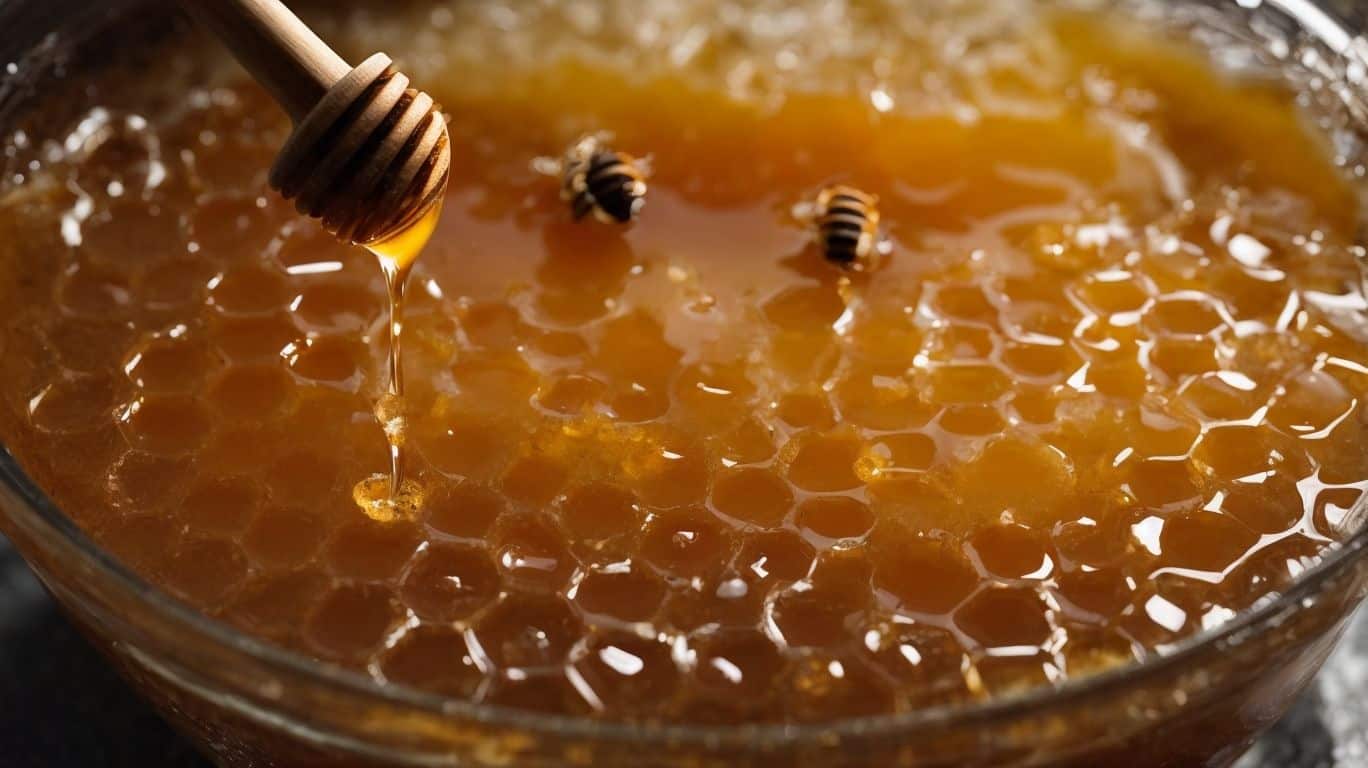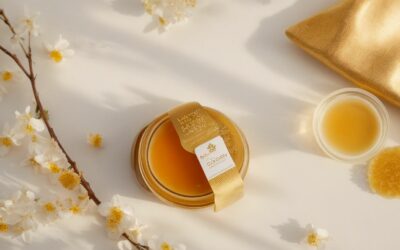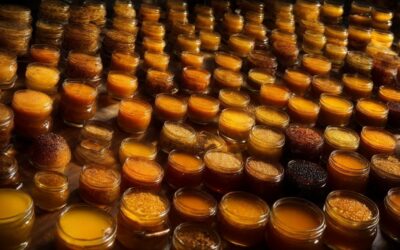Are you looking for a natural way to fight fungal infections? Look no further than manuka honey!
This powerful type of honey has gained popularity for its antifungal properties, making it a potential solution for those struggling with fungus-related issues.
In this article, we will explore the effectiveness of manuka honey as an antifungal and how it can benefit you.
Is Manuka Honey Antifungal?
Yes, Manuka honey has antifungal properties. It contains a substance known as methylglyoxal (MGO) which has been proven to have powerful antimicrobial effects, including against fungi.
Numerous studies have shown that Manuka honey can effectively hinder the growth of different types of fungi, including Candida albicans and Aspergillus species. This makes Manuka honey a natural and effective choice for treating fungal infections.
However, it is important to note that the level of antifungal activity may vary depending on the concentration of MGO in the honey.
Can Manuka Honey Treat Fungal Infections?
Yes, Manuka honey has been proven to possess antifungal properties and can effectively treat fungal infections. The antifungal activity of Manuka honey is attributed to its low pH levels, presence of hydrogen peroxide, and other bioactive compounds.
Studies have shown that it can inhibit the growth of various fungi, including Candida species and dermatophytes. Manuka honey can be applied topically to treat fungal infections on the skin, nails, or scalp, or it can be consumed orally to combat internal fungal infections.
However, it is important to seek medical advice for severe or persistent infections.
Fun fact: The nectar of the Manuka tree‘s flowers is responsible for giving Manuka honey its unique antibacterial and antifungal properties.
How to Use Manuka Honey for Fungal Infections?
Manuka honey has been used for centuries for its medicinal properties, but can it also be effective against fungal infections? In this section, we will discuss how to use manuka honey for fungal infections.
Whether applied topically or consumed orally, manuka honey may offer relief and treatment for various fungal infections. Let’s dive into the two main methods of using manuka honey for fungal infections: topical application and oral consumption.
1. Topical Application
Topical application of manuka honey for fungal infections involves several steps to ensure effectiveness:
- Thoroughly clean the affected area with mild soap and water.
- Gently apply a thin layer of manuka honey directly to the infected area.
- Cover the area with a sterile bandage or dressing.
- Leave the honey on for at least 30 minutes or overnight, depending on the severity of the infection.
- Repeat the process 2-3 times a day until the infection improves.
Remember to consult a healthcare professional before using manuka honey as a treatment for fungal infections. It’s important to note that while manuka honey has potential antifungal properties, it should not replace conventional medical treatments.
2. Oral Consumption
Oral consumption of manuka honey is a popular method for harnessing its health benefits. Here are some steps to follow:
- Choose a high-quality manuka honey with a certified UMF (Unique Manuka Factor) rating.
- Consume a teaspoon of manuka honey on an empty stomach in the morning.
- You can also mix it with warm water or herbal tea for added flavor.
- Allow the honey to dissolve slowly in your mouth before swallowing.
- Repeat this daily for best results in enhancing your immune system and overall well-being.
Pro-tip: To maximize the potential benefits, it is important to use manuka honey as part of a balanced and healthy diet.
Are There Any Risks or Side Effects of Using Manuka Honey for Fungal Infections?
While manuka honey has gained popularity for its potent medicinal properties, it is important to consider any potential risks or side effects associated with its use.
In this section, we will discuss the possible risks of using manuka honey for fungal infections.
These include allergic reactions, the high sugar content of the honey, and potential interactions with certain medications. By understanding these risks, you can make informed decisions about incorporating manuka honey into your treatment plan.
1. Allergic Reactions
Allergic reactions can occur when using manuka honey for fungal infections. If you experience any adverse reactions, follow these steps:
- Stop using the honey immediately.
- Wash the affected area with mild soap and water.
- Apply a cold compress to reduce swelling and itching.
- Take an antihistamine to alleviate symptoms.
- If symptoms persist or worsen, seek medical attention.
Remember to consult with your healthcare provider before using any natural remedies. They can provide guidance on potential risks and interactions.
2. High Sugar Content
While manuka honey has numerous health benefits, it is crucial to be aware of its high sugar content. This can be especially concerning for individuals with diabetes or those trying to regulate their blood sugar levels.
Overconsumption of manuka honey can result in weight gain and a higher risk of dental problems.
It is important to practice moderation when adding manuka honey to your diet, and it is recommended to seek advice from a healthcare professional if you have any health concerns or conditions related to sugar intake.
3. Interactions with Medications
Interactions between manuka honey and medications should be kept in mind and steps should be taken to ensure safe usage. Here are some important tips to follow:
- Consult with your healthcare provider before using manuka honey if you are currently taking any medications.
- Be sure to inform your healthcare provider about all prescription or over-the-counter medications you are using.
- It is possible for some medications to interact with manuka honey, which could potentially alter their effectiveness or cause adverse effects.
- In particular, blood-thinning medications, diabetes medications, and antibiotics may interact with manuka honey.
- Your healthcare provider can provide guidance on the appropriate dosage and timing of manuka honey consumption to avoid any potential interactions.
Frequently Asked Questions
Is manuka honey antifungal?
Yes, manuka honey has been proven to have antifungal properties.
How does manuka honey work as an antifungal?
Manuka honey contains a compound called methylglyoxal, which has been shown to have powerful antifungal effects.
In what forms can manuka honey be used as an antifungal?
Manuka honey can be used topically as a cream, gel, or ointment, or it can be ingested orally as a supplement or added to food and drinks.
What types of fungal infections can manuka honey treat?
Manuka honey has been shown to be effective against a wide range of fungal infections, including athlete’s foot, nail fungus, and yeast infections.
How long does it take for manuka honey to work as an antifungal?
The effectiveness of manuka honey as an antifungal can vary depending on the severity of the infection and the concentration of manuka honey used. In general, it can take a few days to a few weeks to see results.
Are there any side effects from using manuka honey as an antifungal?
In most cases, manuka honey is safe to use as an antifungal with minimal side effects. However, those with allergies to honey or bee products should avoid using manuka honey. Additionally, some people may experience mild irritation or allergic reactions when using manuka honey topically.
I’m a Manuka honey enthusiast and creator of Manuka Honey Organic, a blog where I share my journey with authentic Manuka honey from New Zealand. I want everyone to learn about the healing powers of Manuka honey.





